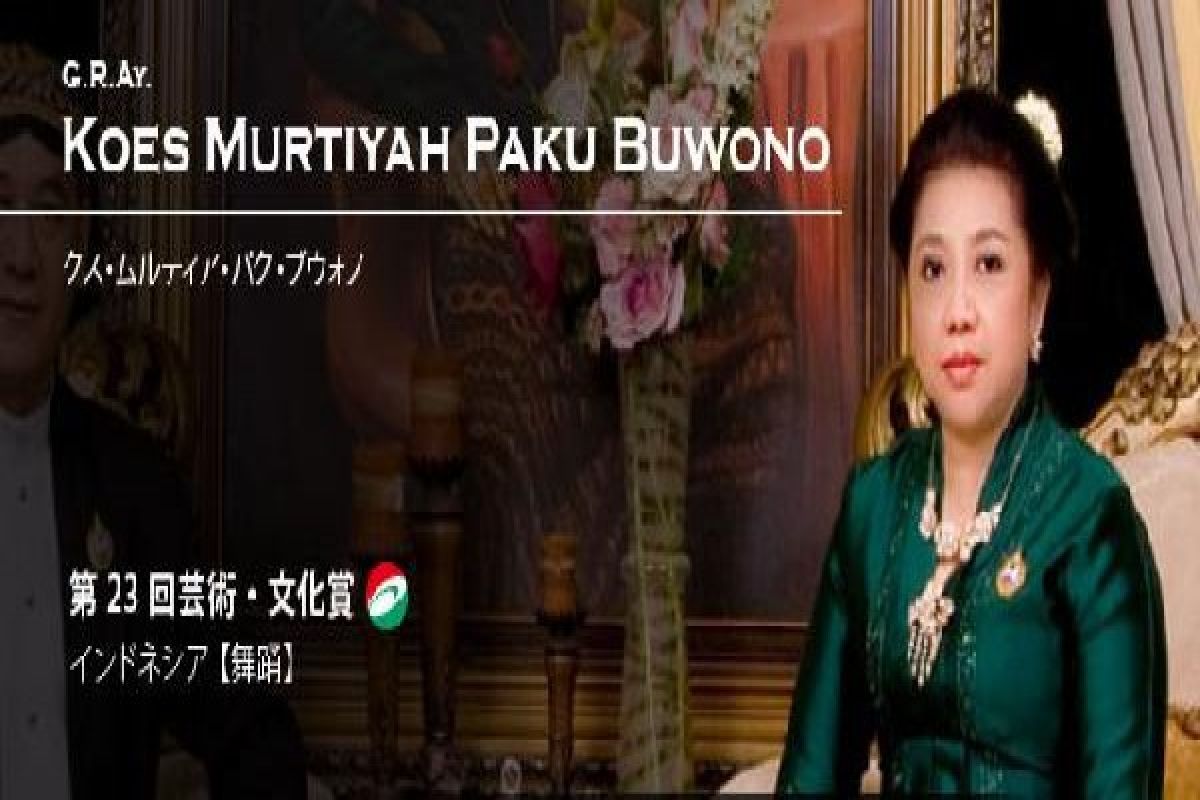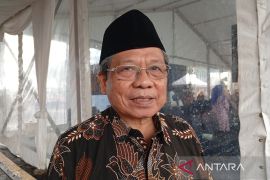"Unlike at academies, our standards are never compromised."Jakarta (ANTARA News) - "Preserving the palace`s traditional culture is the call of my soul. This desire will never end as long as I live, and no one can stop me," said Koes Murtiyah Pakubuwono, which immediately drew applause from the audience.
On that day, the 52-year-old lady, popularly known as Murtiyah Pakubuwono, received an international award relating to arts and culture called the "Fukuoka Prize" from the Japanese government for her outstanding achievement in preserving and promoting the Javanese court culture.
Fukuoka Prize is certainly not an award that can be won easily. The international prize is only awarded to individuals or groups considered to have made a significant contribution to the preservation of Asian culture. Murtiyah Pakubuwono now belongs to that elite group.
G.R.Ay.Koes Murtiyah Pakubuwono is a cultural activist from Central Java, who was born in 1960 as the Javanese princess of Surakarta Palace.
The Javanese princess is heir to a tradition of court culture which has continued for 300 years in the royal house of Mataram in Central Java.
When she was a child, Murtiyah began learning the court dances, which had been handed down from generation to generation at the Javanese court, as a prerogative of royalty. Her talent was recognized early on.
During her upbringing as a member of the royal family, she became deeply concerned about the continuation of the traditional culture in the face of modernization of the Javanese society and economy.
In 1982, she started studying Javanese literature at `Sebelas Maret` State University to further deepen her knowledge about the culture of Java.
Having received a thorough education on Javanese culture during her childhood, she has always strove to promote the traditional court dance while supporting the preservation of central Javanese traditional culture.
Cultural preservation efforts
Murtiyah Pakubuwono, the daughter of Pakubuwono XII, has been preserving and promoting the Javanese court dance in various ways, one of them being through public performances amid full-scale gamelan music concerts.
Based on data collected from the Fukuoka Prize committee, she has conducted more than 20 shows themed around Javanese court dance at the national and international levels.
"I did my first international performance when I was 24 years old. It was entitled `Court Traditional Dance of Surakarta`, and I performed it in Japan, Europe, and the USA," Murtiyah explained.
Some of the dance performances were presented at international festivals, such as Asia Art Festival in Hong Kong, Next Wave Festival in USA, and Quartiers D`ete Festival in France.
Not only that, Murtiyah, supported by her courtiers and other traditional artists of Surakarta Palace, held `Keraton Nusantara Festival` several times between 1995 and 2008 across Indonesia.
The Javanese princess recalled her struggling days when she started studying and promoting the Javanese court dance.
"If I go back 45 years, when I started learning to dance, and when I did dance performances every year to promote Javanese culture in Japan and other countries worldwide, I never thought that I would be rewarded for what I stand for," she stated.
Furthermore, in cooperation with Japanese record company `King Record`, Murtiyah recorded and released a CD on "Srimpi Sangapati", an ancient gamelan music piece that used to accompany Javanese court dances, in an effort to promote Javanese court culture and its significance.
Thanks to such efforts, Javanese court dance has become increasingly popular both at home and abroad.
Facing obstacles and challenges
However, in her effort to preserve and promote the Javanese court culture, Murtiyah has always faced some obstacles and challenges.
"The division of Mataram Sultanate into two sultanates, Surakarta and Yogyakarta, was a key reason for the decline of Javanese court dance`s popularity. Today Mataram faces the challenges of modernization and globalization. Therefore, I keep trying to preserve the traditional court culture and pass them on to the younger generation," the princess explained.
However, as a member of the House of Representatives, she has played an important role in cultural administration, including in the conservation of traditional culture.
"I remember the times when I was regarded as a stubborn person because of my desire to fight for the preservation of the Javanese court culture. In fact, I had even lost my temper at the House of Representatives," she revealed.
Murtiyah said the major challenge that she must face is to pass on the culture and its values to the younger generation.
In an effort to overcome the challenge, Murtiyah has opened `Court Culture Studio` at Surakarta Palace where she can teach important aspects of Javanese court culture, such as Javanese language grammar, court ethics, traditional court dances, gamelan music, and shadow puppet.
"The Javanese cultural lessons taught at academic classes are not the same standard as what is taught at the palace," she said.
"Unlike at academies, our standards are never compromised. Therefore, things are still difficult sometimes because there isn`t enough support from the government," Murtiyah noted.
Support and basic principles
Fortunately, Murtiyah is not alone in her struggle. She has been supported by the courtiers and traditional artists of Surakarta Palace.
She said she also feels grateful to God because her eldest daughter has joined her in her efforts to preserve the Javanese court culture of Surakarta.
In addition, Murtiyah and people of Surakarta Palace continue to hold on to the three basic principles on preserving the culture.
"The three principles have been handed down over generations since the time of Mataram kingdom. They are maintaining the harmony of natural life, maintaining relationships with God and fellows, and maintaining magnanimity," the princess said.
"The three pillars will always be remembered by the people of Surakarta as a reference for protecting the Javanese court cultural treasures," she said.
The efforts led to results
Murtiyah has made great achievements with her dedication and efforts.
She has received several awards, including the `Bhakti Upapradana` award from the local government of Central Java in 1997 and `Adipura` award from the local government of Yogyakarta - for her services in the field of tourism, arts and culture.
Her greatest international achievement was that she made Javanese court dances as well-known globally as the Balinese dance.
According to a Fukuoka local government representative, Aki Nonaka, the Fukuoka Prize committee chose Murtiyah because of her dedication and achievement in preserving and promoting Javanese court culture to the international world.
"Mrs. Pakubuwono doesn`t only preserve the culture, but she also passes it to the younger generation even though it is not an easy thing to do. That`s why she deserves the Fukuoka Prize," Nonaka explained.
"In addition, she has a high artistic value and continues holding Javanese cultural art events in almost all parts of the world," she added.
The princess expressed appreciation to the Japanese government for the Fukuoka Prize. She also admitted that the award has encouraged her and people of Surakarta to continue preserving and advancing the Javanese court culture.
"However, loving and preserving the culture is a call of our souls. We will continue to do so without being asked or commanded because it has been embedded in our hearts," the Javanese princess of Surakarta said.
(T.Y012/INE/KR-BSR/H-YH)
Reporter: by Yuni Arisandy
Editor: Priyambodo RH
Copyright © ANTARA 2012












